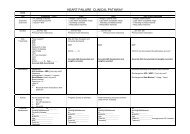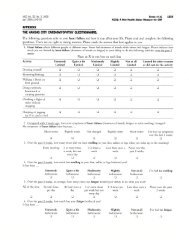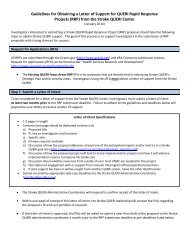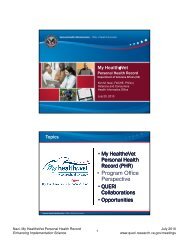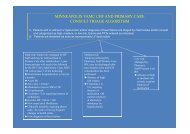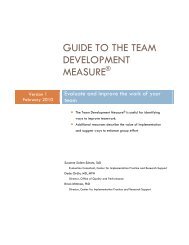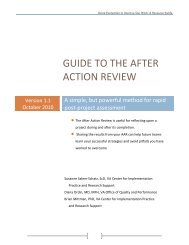The Veteran Supported Education Service Treatment Manual: VetSEd
The Veteran Supported Education Service Treatment Manual: VetSEd
The Veteran Supported Education Service Treatment Manual: VetSEd
Create successful ePaper yourself
Turn your PDF publications into a flip-book with our unique Google optimized e-Paper software.
viii. How does the <strong>Veteran</strong> plan to pay for school?<br />
In addition to the GI Bill, <strong>Veteran</strong>s may utilize a range of other sources to pay for living<br />
and educational expenses while in school. Some <strong>Veteran</strong>s choose and are able to do this<br />
solely with the use of the GI Bill. Other <strong>Veteran</strong>s choose or need to have other options<br />
such as working part time, or utilizing other income sources (school financial aid<br />
packages, loan/gift from family member, service connection, etc.) to pay for school.<br />
Work and School Balance<br />
Some <strong>Veteran</strong>s will prefer to start or continue work while in school, citing the added<br />
structure of employment and other factors as reasons to work. Still other <strong>Veteran</strong>s will<br />
prefer to focus their time only on school if they can afford to do so. First, ask the <strong>Veteran</strong><br />
about his/her thoughts and preferences about this issue. If the <strong>Veteran</strong> is unsure how s/he<br />
feels about it, then it may be useful for you as the peer <strong>VetSEd</strong> provider to complete<br />
Worksheet #9a: Ups and Downs for Going to School and Worksheet #9b: Ups and Downs<br />
for Going to School AND Working with the <strong>Veteran</strong>. This will help the <strong>Veteran</strong> weigh the<br />
pros and cons of both possible scenarios.<br />
Some items to consider in making these lists:<br />
<strong>The</strong> flexibility of work and class schedules in order to accommodate both<br />
<strong>The</strong> degree to which work will positively impact <strong>Veteran</strong>‘s self-esteem and social<br />
connections from starting a job or staying at current job<br />
<strong>The</strong> degree to which work hours and energy spent on work will impact school<br />
Time spent commuting between home, school, and work<br />
Adequate time for rest, leisure, treatment for mental health or physical health<br />
issues, and family/friends<br />
<strong>The</strong> number of other people in the <strong>Veteran</strong>‘s academic program who work (for<br />
some programs and schools, most people do work while going to school, and for<br />
others it is rare for people to be able to work and go to school due to the<br />
requirements)<br />
Once you and the <strong>Veteran</strong> have started these lists, the <strong>Veteran</strong> may also seek information<br />
from family/friends and school advisors to gather additional feedback and information.<br />
<strong>The</strong> important thing for you and the <strong>Veteran</strong> to remember is that s/he can always try out<br />
either school only or work and school and then make a different choice during the<br />
semester. If a <strong>Veteran</strong> needs help with finding work, you can talk to your supervisor<br />
about possible referral options to the vocational rehabilitation services offered at your VA<br />
hospital, VR&E, Vet Success and local career centers.<br />
53 | P a g e



